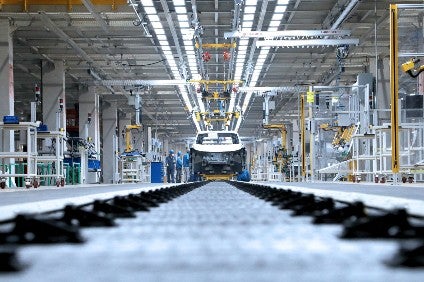
Automakers across China restarted production this week, after three weeks of shutdowns to help prevent the spread of the COVID19 virus, although most are operating in conditions far from normal.
Having followed the guidelines of provincial governments to extend the Lunar New Year shutdowns, vehicle manufacturers in most areas of China have been allowed to resume production at their factories in an effort to kick start an economy that virtually ground to a halt late in January.

Discover B2B Marketing That Performs
Combine business intelligence and editorial excellence to reach engaged professionals across 36 leading media platforms.
Local officials have been given orders by the ruling Communist Party to get businesses functioning again while putting in place measures to help contain the spread of the virus such as taking daily temperature readings of workers, making face masks compulsory and ensuring workers maintain a minimum distance from each other.
Only Wuhan, the city at the epicentre of the virus outbreak, remains in lockdown for most of this week. Vehicle assembly plants in this region, including joint ventures with Honda, PSA Group and Renault, will remain closed until at least next week.
Toyota Motor reopened two factories on 17 February, in Changchun, Jilin province, and in Guangzhou, Guangdong province, and its Tianjin plant on 18 February.
A restart date had yet to be scheduled for its Chengdu plant in Sichuan province.
Other major automakers in the country, including Volkswagen’s joint ventures with SAIC Motor and FAW, restarted operations on 17 February while General Motors began a staggered restart at its plants on Saturday 15 February.
Automakers in Beijing, including the Mercedes-Benz and Hyundai joint ventures, were allowed to restart operations last week while Nissan said it was also planning to resume operations on Monday.
Many factories have reopened with severe shortages of workers because millions of people travelling back from the Lunar New Year holidays were required to undergo 14 day self imposed quarantine.
Supply chains also remain disrupted and will take time to normalise, meaning most vehicle plants will need time to return to full production.
It is unclear what effect COVID19 has had on consumer and business confidence in the country with many having already suffered significant financial losses due to the shutdowns.
Some analysts are already talking about a market rebound in the second half of the year, citing significant economic stimulus already introduced by the central government, but many consumers are unlikely to be in the mood to make major purchases for some time.
After an 18% decline in vehicle sales in January, and a drop of at least 50% expected in February, the first quarter of 2020 already looks like a write off.






